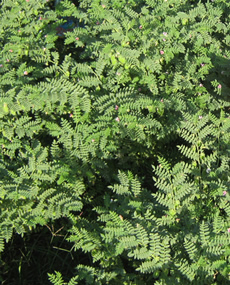Agriculture
 Allelopathy refers to all the biochemical interactions, both beneficial and harmful, among all types of plants, including microorganisms.
Allelopathy refers to all the biochemical interactions, both beneficial and harmful, among all types of plants, including microorganisms.
For an allelopathic interaction to occur, chemicals must be released into the environment by one plant that will affect the growth of another. In this way allelopathy differs from competition, which involves removal of some factor from the environment that is shared with other plants. Allelopathy was recognized as early as Theophrastus (300 b.c.e.), who pointed out that chick pea plants destroy weeds growing around them.
Methods of Action
Avariety of different allelochemicals are produced by plants, usu- ally as secondary metabolites that do not have a specific function in the growth and development of the host plant but that do affect the growth of other plants. Originally plant physiologists thought these secondary products were simply metabolic wastes which plants had to store because they do not have an excretory system as animals do. Their various functions are now beginning to be understood.
One class of allelochemicals, coumarins, block or slow cell division in the affected plant, particularly in root cells. In thisway growth of competing plants is inhibited, and seed germination can be prevented. Several kinds of allelochemicals, including flavonoids, phenolics, and tannins, suppress or alter hormone production or activity in competing plants.
Other chemicals, including terpenes and certain antibiotics, alter membrane permeability of host cells, making them either leaky or impermeable. In some cases, membrane uptake can be enhanced, particularly for micronutrients in low concentration in the soil. Finally, a variety of allelochemicals have both positive and negative effects on metabolic activity of the affected plant.
Allelopathy in Agriculture
Most of the negative effects of weeds on crop plants have been attributed to competition; however, experiments using weed extracts have demonstrated that many weeds produce allelochemicals. Similarly, some crop plants are allelopathic to others and themselves, including wheat, corn, and rice. In these cases the residues of one year?s crop can interferewith crop growth in subsequent years.
This is increasingly important for farmers to consider who are incorporating low-tillage methods to reduce soil erosion. To minimize these effects, some of the traditional techniques of cover cropping, companion cropping, and crop rotation must be employed. Known allelopaths are also beginning to be used as biological control agents to manage invasive and weedy plant species.
Allelopathy in Nature
Several tree species, including black walnut, black locust, and various pines, are known to produce allelochemicals that inhibit the growth of understory species. In some cases this is a result of drip from the foliage or leachate from fallen leaves and fruit. In other cases, roots secrete allelochemicals that kill seedlings of other plants. Bracken fern (Pteridium aquilinum) is known to affect the growth of many other plants.

- Biochemical Coevolution In Angiosperms
Biochemical Coevolution in AngiospermsFlowering plants, or angiosperms, produce many compounds that are not directly related to growth and development. These secondary metabolites arise from primary metabolic pathways and act as antiherbivory mechanisms,...
- Community - Ecosystem Interactions
Ecosystems are complex organizations of living and nonliving components. They are frequently named for their dominant biotic or physical features (such as marine kelp beds or coniferous forests). Communities are groups of species usually classified according...
- Weed Classification
How many plants have these weedy characteristics? Relatively few, in fact. There are approximately 250,000 species of plants in the world, but only about 200 species are considered to be major weed problems (Holm, et al., 1977). In addition to this small...
- Weeds Control In Upcoming Era
Asad Manzoor Department of Agriculture and Agribusiness Management University of Karachi [email protected] In the upcoming era, weed control methods currently being intensively researched will allow prolonged weed control options away from herbicides...
- Crop Growth Promotion Through Allelopathic Water Extracts
Ali AhsanBajwa, Dr. Muhammad Farooq and Zahid Ata Cheema Allelopathy Lab, Department of Agronomy, University of Agriculture, FaisalabadIncreasing global population demands high crop production to meet the food requirements. Sustainable agriculture ensures...
Agriculture
Allelopathy

For an allelopathic interaction to occur, chemicals must be released into the environment by one plant that will affect the growth of another. In this way allelopathy differs from competition, which involves removal of some factor from the environment that is shared with other plants. Allelopathy was recognized as early as Theophrastus (300 b.c.e.), who pointed out that chick pea plants destroy weeds growing around them.
Methods of Action
Avariety of different allelochemicals are produced by plants, usu- ally as secondary metabolites that do not have a specific function in the growth and development of the host plant but that do affect the growth of other plants. Originally plant physiologists thought these secondary products were simply metabolic wastes which plants had to store because they do not have an excretory system as animals do. Their various functions are now beginning to be understood.
One class of allelochemicals, coumarins, block or slow cell division in the affected plant, particularly in root cells. In thisway growth of competing plants is inhibited, and seed germination can be prevented. Several kinds of allelochemicals, including flavonoids, phenolics, and tannins, suppress or alter hormone production or activity in competing plants.
Other chemicals, including terpenes and certain antibiotics, alter membrane permeability of host cells, making them either leaky or impermeable. In some cases, membrane uptake can be enhanced, particularly for micronutrients in low concentration in the soil. Finally, a variety of allelochemicals have both positive and negative effects on metabolic activity of the affected plant.
Allelopathy in Agriculture
 |
| How to grow juicy tasty tomatoes |
This is increasingly important for farmers to consider who are incorporating low-tillage methods to reduce soil erosion. To minimize these effects, some of the traditional techniques of cover cropping, companion cropping, and crop rotation must be employed. Known allelopaths are also beginning to be used as biological control agents to manage invasive and weedy plant species.
Allelopathy in Nature
Several tree species, including black walnut, black locust, and various pines, are known to produce allelochemicals that inhibit the growth of understory species. In some cases this is a result of drip from the foliage or leachate from fallen leaves and fruit. In other cases, roots secrete allelochemicals that kill seedlings of other plants. Bracken fern (Pteridium aquilinum) is known to affect the growth of many other plants.

- Biochemical Coevolution In Angiosperms
Biochemical Coevolution in AngiospermsFlowering plants, or angiosperms, produce many compounds that are not directly related to growth and development. These secondary metabolites arise from primary metabolic pathways and act as antiherbivory mechanisms,...
- Community - Ecosystem Interactions
Ecosystems are complex organizations of living and nonliving components. They are frequently named for their dominant biotic or physical features (such as marine kelp beds or coniferous forests). Communities are groups of species usually classified according...
- Weed Classification
How many plants have these weedy characteristics? Relatively few, in fact. There are approximately 250,000 species of plants in the world, but only about 200 species are considered to be major weed problems (Holm, et al., 1977). In addition to this small...
- Weeds Control In Upcoming Era
Asad Manzoor Department of Agriculture and Agribusiness Management University of Karachi [email protected] In the upcoming era, weed control methods currently being intensively researched will allow prolonged weed control options away from herbicides...
- Crop Growth Promotion Through Allelopathic Water Extracts
Ali AhsanBajwa, Dr. Muhammad Farooq and Zahid Ata Cheema Allelopathy Lab, Department of Agronomy, University of Agriculture, FaisalabadIncreasing global population demands high crop production to meet the food requirements. Sustainable agriculture ensures...
